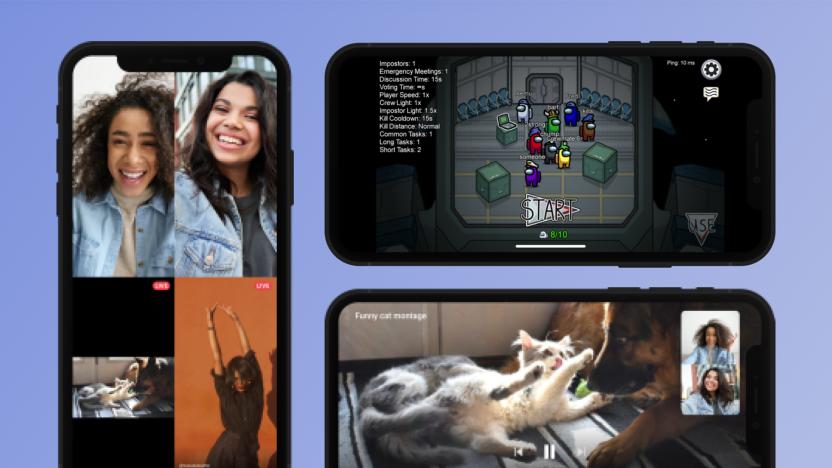communications
Latest

Apple reportedly hires Meta's AR public relations lead
As rumors continue to swirl about its augmented reality headset, Apple has reportedly hire away Meta's AR public relations head.

Zoom's latest update includes gesture-activated reactions on iPad
Zoom's latest major update adds new features to meetings, chats and calls.

Discord's screen sharing feature comes to smartphones
A few years back, Discord gave everyone the ability to boot up their laptop or PC, jump into a group call and share what's happening on their screen. Similar to the desktop client, you'll be able to open the mobile app and broadcast everything that's happening on your iPhone or Android handset. Nothing is off limits, essentially, unless you dive into an app that doesn't allow screen recording, such as Netflix.

Australian law could force tech firms to hand over customer data
Australia has been relying on criminal telecommunications legislation dating back to the days of the landline, so proposed laws unveiled today are designed to bring the country's legal enforcements in line with the many nefarious opportunities the internet presents for hackers. But it's raised eyebrows among some industry experts.

After Math: Calls for alarm
While the survivors of the Stoneman Douglas shooting provided the nation with a master class in how to effectively articulate policy reform demands and ruthlessly drag talking heads of the political class, the tech industry had some communication issues of its own. Like the 1,600 911 calls a set of iPhones at a California repair center made, or the Tinder security flaw that enabled account access with only a phone number, or how the FCC is getting sued (again) for trying to roll back Net Neutrality rules. Numbers, because how else are you going to see how savagely the NRA is getting ratioed?

FCC hopes opening up communication airwaves will boost innovation
Today, the FCC voted to move forward with a proposal to open up communications spectrum beyond 95 GHz. In a statement, it said that spectrum above this range has been thought to be at the edge of what's usable, but now it wants to provide different levels of authorization to use the spectrum to, as Chairman Ajit Pai said in a statement, "promote innovation and help put this spectrum to its best use." Pai noted that some might be skeptical as to whether spectrum above 95 GHz can actually be used, but he added, "The point is that we must be open to new technologies that haven't even been developed. And while we don't know precisely how far the laws of physics will permit us to go, we do know there's potential and interest. Engineers and entrepreneurs need to have the ability to push the envelope."

Democrats demand the FCC tackle cybersecurity
Two Democrats in Congress are imploring FCC head Ajit Pai to address cybersecurity issues in the United States, arguing vulnerabilities in cellular networks infringe on citizens' liberties and pose a "serious threat" to national security. Sen. Ron Wyden and Rep. Ted Lieu penned a letter to Pai laying out known issues in modern communications systems and asking the FCC to step in. However, that's unlikely to happen.

DARPA tests buoy network for fallback military comms at sea
It doesn't matter how many war machines you have under your command if you can't relay orders to their operators. Maintaining communications is just as important as firepower, and DARPA wants the armed forces to have as many contingencies as possible when networks go down or are actively jammed. Setting up a fallback network is even trickier on the open ocean, but the agency's Tactical Undersea Network Architecture (TUNA) program is well on its way to a solution. That solution being a collection of "node" buoys, deployed from ships or planes, that are tethered together by fiber optic cables to create a radio frequency data network.

Twitch brings video calls to its game communication app
Twitch wants to move beyond live streaming to cover your game communications, and to that end it bought Curse back in August. Just what is it doing with its newly acquired app, though? Well, now we know: Curse is rolling out desktop support for both video calls and screen sharing on top of its existing voice and social features. You and four other people can now see each other while you play, and share what's on your display if you want to brag about a victory or show vital info to your teammates.

Now you can call 199 of your Line friends simultaneously
Messaging service Line introduced a unique new feature with the latest update to its mobile and desktop apps: the ability to conference call with up to 200 people. Skype, for comparison, supports only 25-person chats. The feature is now available on iOS, Android and Windows desktop with Mac support coming soon. The feature is free and can be initiated from both group and multi-person chats. Interestingly, the conference call feature will first be released outside of Asia -- sort of as an informal beta test before Line introduces it to its core markets of Japan, Thailand, Taiwan and Indonesia.

FCC will publish telemarketer phone numbers to help you block them
The Federal Communications Commission has said that protecting consumer privacy is one of its biggest priorities, and its latest actions prove just that. The communications bureau is going to publish the phone numbers of telemarketers on a weekly basis in an effort to help you preemptively block those annoying calls saying you've won a cruise or some other outlandish claim that might require forking over your credit card info. The idea here is that by releasing these regularly and opening up the data, it'll help software developers build automated apps and the like for heading the calls off before they happen, and improve tech that already exists. This is a natural extension of June's ruling regarding carriers blocking spam numbers, and the FCC says it's still working on a way to extend that to landlines. Want a peek at the first sets of digits? The Verge found the first list. [Image credit: Getty Images]

US Army wants to send small, cheap satellites to space
The military has been conjuring up one idea after another in an effort to improve its personnel's ability to communicate, such as putting LTE on a ship and launching a WiFi router to space. This time, the US Army is in the midst of testing nanosatellites that will provide coverage for soldiers' radios wherever they are. The Army's having trouble providing a means of communication between soldiers in rural areas, and these small satellites called SMDC-ONE (ONE stands for Orbital Nanosatellite Effect) can solve that issue. "It's basically a cellphone tower in space," Dr. Travis Taylor, a senior scientist of the Army's space division said, "except it's not for cellphones, it's for Army radios." His team made sure SMDC-ONEs are tough enough to survive harsh conditions, but since the devices are small, they could still be displaced by space junk or ruined by adverse space weather.

UK's emergency surveillance law struck down by MPs
The High Court has ruled today that parts of the UK's emergency surveillance legislation, the Data Retention and Investigatory Powers Act 2014 (DRIPA), is unlawful. Conservative MP David Davis and Labour MP Tom Watson, represented by the Liberty human rights organisation, have successfully argued that the law breaks the public's right to a private life and to the protection of personal data, set out in the EU Charter of Fundamental Rights. Section 1 and 2 of DRIPA, which forces telecoms companies and internet providers to store customer data for up to 12 months, will now be abolished in March next year. The law is due to expire at the end of 2016 anyway, but bringing the date forward for these two crucial points could force the government to introduce replacement legislation earlier.

NASA shoots lasers at the moon, sets new data transmission record
Lasers are indisputably awesome, and NASA just made them a little more so by zapping a record-breaking 622 Mb of data per second between the moon and earth as a part of its Lunar Laser Communications Demonstration (LLCD). Pulsed laser beams were shot from ground control at the White Sands Test Facility in New Mexico to the Lunar Atmosphere and Dust Environment Explorer (LADEE) satellite orbiting the moon, and the results could herald promising new advances in deep space communication. Radio waves have long been the go-to option for sending information between spacecraft and our planet, but the greater data capacity lasers can accommodate may make it possible for future missions to send higher resolution images and 3D video transmissions across two-way channels. To learn more, take a peek at the press release after the break or head over to the official LLCD site at the source link below.

Discovery Communications working on a HBO Go-esque streaming service
Discovery Channel, DMAX, 3NET (with Sony and IMAX) and Revision 3 owner Discovery Communications is pondering an HBO Go-style streaming service. In an interview with Reuters, company boss John Hendricks said that shows that are between three and 18 months old can still make money before they're launched on Netflix. His plan is to let subscribers access that programming online for a small additional monthly fee, which, according to Hendricks' autobiography, is between $6 and $8 a month. The boss also said that the company is developing the infrastructure for the platform, but that we won't see such a service arrive for anything up to five years.

Sorry iPad owners, BBM for iOS will be iPhone only
RIM announced earlier this week that BlackBerry Messenger (BBM) is coming to both iOS and Android as a free download later this summer. While RIM's market share continues to plummet, the number of folks who still use BBM is rather impressive. In a post on BlackBerry's official blog earlier this week, RIM boasted that BBM services more than 60 million active users per month and that BBM users send and receive more than 10 billion messages each and every day. For iOS users excited to explore, or perhaps get reacquainted with BBM, I should point out that BBM for iOS will only work on iPhones running iOS 6. In other words, iPad owners need not apply. The news comes courtesy of Trusted Reviews which was able to get a direct statement on the matter from BlackBerry Software Portfolio head Vivek Bhardwaj. "Smartphone is our real focus and and again it comes back to what BBM is," Bhardwaj explained. "If you look BBM and the engagement and the activity, it's because it is mobile, because people are on the go." That's not to say that BBM for the iPad won't eventually see the light of day, but for the time being, BBM on smartphones appears to be the only thing on RIM's radar. Explaining the company's decision to avoid iPad and other tablets in order to focus the BBM app launch on smartphone devices, he stated: "When you start looking at tablets, computers and other screens, the usage model changes and behaviour changes. For us right now the absolute focus is getting BBM onto smartphones. As previously indicated, BBM for iOS will include the following features: The immediacy of BBM chats Multi-person chats Voice note sharing BlackBerry Groups, where BBM users are able to set up groups of up to 30 people and share calendar, photos, files and more

Viber expands its VoIP service with new OS X app
Viber is a voice-over-internet app that's seen some success on iOS already, but today the company announced a brand-new version for both OS X and Windows. Viber Desktop has all of the features of the iOS app, including free messages and calls to other users, synced contacts and history between the mobile and desktop clients, and the ability to start up group conversations and so on. The iOS version and the desktop version are completely integrated, so you can even start a call on one platform, and then transfer it across to another. Both versions are completely and totally free to use. The iOS version also got an update this week, which includes a new voice engine, the ability to send video messages to your contacts and a number of other design and feature updates. If you haven't checked out Viber yet and have a need for a voice-over-IP client, now is your chance.

iPad app listens to conversations, suggests topics
MindMeld from Expect Labs is a conversation tool for the iPad that listens to what you are saying and suggests relevant content. The app requires you to login with your Facebook account and find friends with whom you want to talk. You can add some friends and start a voice conversation using the VoIP features built into the app. When someone says something interesting, you can turn on the listening feature of the app. MindMeld will then parse the conversation and try to pick out relevant keywords from what everyone is saying. When it finds important conversation topics, the app will display matching results from Facebook and the internet. If you mention a restaurant, you will see restaurant reviews, for example. You can easily share this content with other members of the conversation. The app also keeps an ongoing record of what people said so you can look back at an earlier part of the conversation. The app is meant to help you find and share information and is not designed to send you targeted ads. You can watch the demo of the app below and let us know in the comments what you think. Is this technology cutting-edge or just plain creepy? [Via Springwise]

Broadcom extends fiber reach with BroadLight acquisition, intros new location architecture
Here's a question: did Broadcom get a 50 percent discount for acquiring a company that already had "Broad" in the name? Hard to say at this point, but regardless of semantics, the aforesaid company has snapped up BroadLight in a bid to extend its fiber access portfolio. In lay terms, it's hoping to use BroadLight's inroads to roll out next-gen fiber networks across the globe -- perhaps even through the arctic. In semi-related news, Broadcom has also chosen today to reveal a new location architecture, which will reportedly provide "more responsive outdoor and indoor positioning capabilities for smartphone devices." The new system opens the door for even more indoor GPS locks, and it relies on a minty fresh Global Navigation Satellite System (GNSS) chip that "significantly reduces time-to-first-fix (TTFF) for outdoor positioning applications." The full deets on both can be found in the source link, but sadly there's no word on when the fancy new positioning tech will meander into your next handset.

New undersea cables planned for arctic passageways, frozen gamers dream of lower pings
Hot on the heels of our own reporting of cables in the South Pacific (or the lack thereof), in flies a report that at least two new undersea cables are being planned for the arctic. According to New Scientist, a pair of lengthy fiber optic wires will be laid through the Northwest Passage above North America, connecting Japan to the United Kingdom. Moreover, a third cable is planned along the Russian coastline, with the longest of these links to purportedly become "the world's longest single stretch of optical fiber." A number of outfits are on the list to help out, and when complete, the latency between Tokyo and London should be reduced between 168ms and 230ms. The cost for such luxury? An estimated $600 million to $1.5 billion for each line. In other words, totally worth it.















